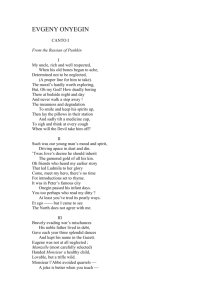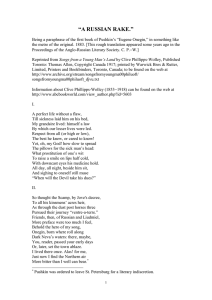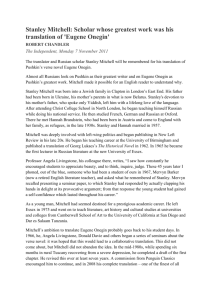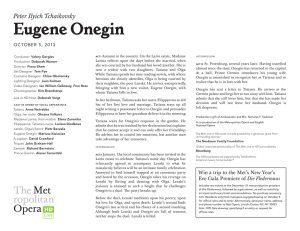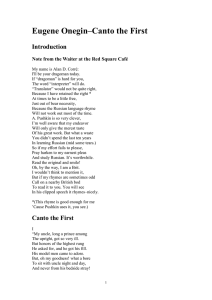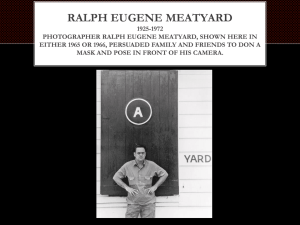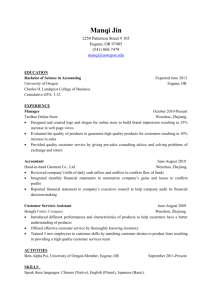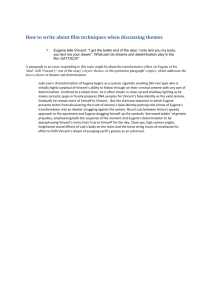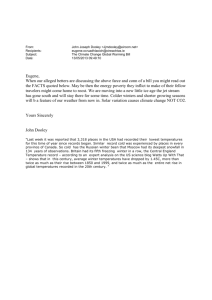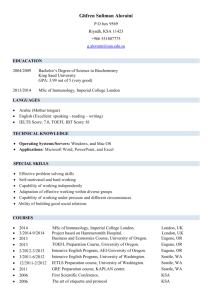Cahill_rev
advertisement
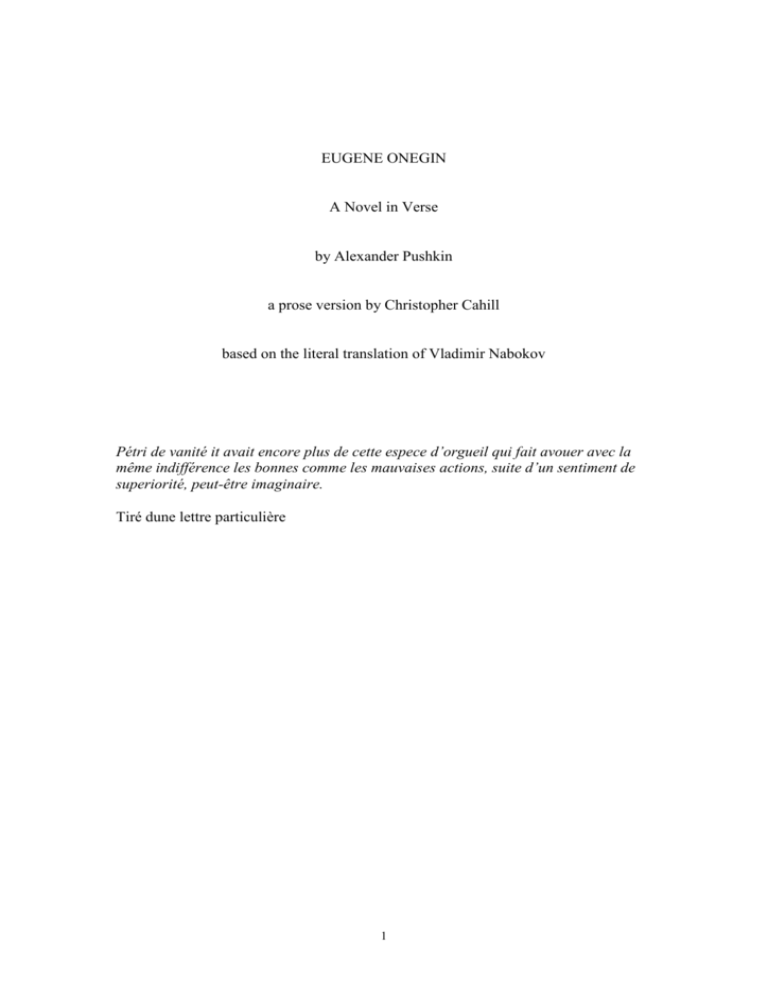
EUGENE ONEGIN A Novel in Verse by Alexander Pushkin a prose version by Christopher Cahill based on the literal translation of Vladimir Nabokov Pétri de vanité it avait encore plus de cette espece d’orgueil qui fait avouer avec la même indifférence les bonnes comme les mauvaises actions, suite d’un sentiment de superiorité, peut-être imaginaire. Tiré dune lettre particulière 1 To Petr Aleksandrovich Pletnyov Not thinking to amuse the great world, caring more for my attentive friends, I wish my gift was worthier of you — of a fine soul filled with holy dreams, with live and limpid poetry, with lofty thoughts and simple ones. Oh, well. Smile if you will on this collection of uneven chapters: half droll, half sad, pedestrian, ideal, the careless fruit of my amusements, insomnias, light inspirations, unripe and withered years, the intellect’s cold observations and the heart’s sorrowful remarks. CHAPTER ONE To live it hurries and to feel it hastens. Prince Vyazemsky I “My uncle’s a man of honest principles: when he got ill, he forced us to respect him for the first time — his best trick ever. He’s an example to others; but, good God, what a bore to sit by a sick man day and night, never wandering a step away! How deceitful to amuse a half-dead man, fluff his pillows, give him his medicine, and sigh — all the while thinking, ‘When will the devil take you?’” II This is what a young rake thought as he flew with post horses in the dust, the heir, by the high will of Zeus, of all his relatives. Friends of Lyudmila and Ruslan! Without further ado I’d like you to meet the hero of my novel: Onegin, a good friend of mine, was born beside the Neva, where maybe you, dear reader, were born or shone once. I’ve walked there too — but the North isn’t so good for my health. III Having served excellently, nobly, his father lived on debt, gave three balls a year, and squandered everything in the end. Fate guarded Eugene: at first, Madame looked after him; later, Monsieur replaced her. He was a boisterous but charming child. Monsieur l’Abbé, a poor wretch of a Frenchman, so as not to wear out the infant, taught him every frivolous thing, didn’t burden him with morality, barely scolded him for his pranks, and took him to walk in Letny Park. IV Then, when Eugene’s stormy youth arrived, that time of hope and tender melancholy, Monsieur was kicked out of the house. Now my Onegin is at large: hair cut after the latest fashion, dressed like a London Dandy — and finally he saw the great world. He could speak and write French impeccably, he danced the mazurka gracefully and bowed freely — what more could you want? Society decided that he was clever and charming. V All of us had learned just a little of this and a little of that: so it’s not hard, thank God, to flaunt one’s education in our midst. Onegin was, in the opinion of many (stern and resolute judges), well-read but a pedant. He had the happy talent to always touch lightly on everything in conversation, to stay silent, with an erudite air, during weighty discussions, and to make the ladies smile with his quick wit. 2 VI Latin’s out of fashion now; but, to tell you the truth, he knew just enough Latin to make out epigraphs, blather about Juvenal, and sign off his letters vale; and he had memorized, incorrectly, two lines from the Aeneid. He wasn’t the kind to rummage in dusty books of history, but he did have a store of anecdotes running from the time of Romulus till now. VII Lacking that high passion for measured sounds over which we ruin our lives, he couldn’t, despite our best efforts, tell an iamb from a trochee. He disparaged Homer and Theocritus; instead, he read Adam Smith and was a deep economist: which is to say that he could assess the way a state grows rich, what it subsists upon, and why it doesn’t need gold when it has basic products. His father couldn’t understand him and mortgaged his lands. VIII I haven’t the time to tell you everything else Eugene knew; but where he was a true genius, what he knew better than all the arts — what had been, since his youth, his foremost labor, torment, and delight, what took up the anxious, lazy hours of each long day — was the art of soft passion which Ovid sang, the reason why that poet ended his brilliant and unruly life suffering, in Moldavia, deep in the steppes, far from his Italy. IX ……………………………….... X At what a young age he’d learned to lie, conceal his desires, show jealousy, disenchant, enchant, seem gloomy, pine away, appear proud and obedient, attentive or indifferent! How languorously silent he was, how fierily eloquent, how casual in his love letters! How unselfconscious he could be when love inspired his breath, his heart! How quick and tender his gaze was, how bashful and daring, always ready to shine with an obedient tear! XI How easily he could seem original, astonish the unsuspecting with a joke, frighten with feigned desperation, amuse with pleasant flattery, strike at a moment of softheartedness; conquer young innocents with cunning and passion, wait for impulsive favors, beg or demand avowals, eavesdrop on a heart’s first sound, pursue love — and then suddenly win a secret assignation, and afterward, alone with the girl, teach her love in some quiet refuge! XIII At what a young age he could trouble the hearts of admitted coquettes! Or when he wanted to annihilate his rivals, what vicious tales he’d tell! What traps he’d prepare for them! But you, lucky husbands, you stayed friends with him: he was the favorite alike of the worldly man (a longstanding disciple of Faublas), the suspicious geezer, and the pompous cuckold, always pleased with himself, his dinner, and his wife. XIII, XIV 3 ……………………….. XV He’d often still be in bed when little notes would be brought to him. What? Invitations? Yes, indeed, three houses ask him to a soiree: Here there’s be a ball; somewhere else a children’s party. So where is my rake to go? Where will he start? Never mind: it’s easy to get to them all in time. Meanwhile. in morning dress, having put on a broad bolivar, Onegin drives to the boulevard and strolls in the open there until his ever-vigilant Breguet watch chimes for dinnertime. XVI It’s already dark. He gets into a sleigh. The cry resounds: “Out of the way, out of the way!” Frostdust silvers his beaver collar. He’s dashed off to Talon’s: he’s sure that his friend Kaverin is already waiting for him there. Now he’s come in — and the cork is shot toward the ceiling, a flow of Comet wine spills out, a bloody roast beef is put before him, and truffles (luxury of the young, the finest flower of French cooking), and a Strasbourg pate wedged between a ripe Limburg cheese and a golden pineapple. XVII He calls for more wine to drown the hot fat of the cutlets; but Breguet’s chime tells them that a new ballet’s begun. The theater’s harsh taskmaster; inconstant lover of enchanting actresses; a freeman of the greenroom, Onegin has flown to the theater, where everyone’s a critic ready to applaud an entrechat, hiss Phaedra or Cleopatra, call out Moena for an encore — anything to be heard. XVIII An enchanted region! There in the old days Fonvizin — the master of brave satire, freedom’s friend — and the derivative Knyazhnin sparkled; there Ozerov shared the tributes of unprompted tears, of praise, with the young Semyonova; there our Katenin resurrected Corneille’s majestic genius; there caustic Shahovskoy produced his noisy, swarming comedies; there, too, Didelot crowned himself with glory; there, there, in the wings, my youth swept past. XIX My goddesses! What’s become of you? Where are you? Listen to my sad voice: Are you still the same as you were? Have other girls taken your place, though they could never replace you? Will I ever hear your songs again? Will I ever see again the Russian ballerina’s soulful flight? Or will my mournful gaze see only unfamiliar faces on the dreary stage, and, having looked, disenchanted, at its foreign world, will I, an indifferent spectator, yawn silently and recollect the past? XX By now the house is full; boxes glitter; parterre and stalls — everything seethes; in the top gallery they clap impatiently and, soaring up, the curtain swishes. Resplendent, half ethereal, obedient to the magic bow, surrounded by a throng of nymphs, Istomina stands: while touching the floor with one foot, she turns the other slowly, and look! a leap, and look! she flies, she flies like fluff from Eol’s lips, now twines and now untwines her waist and beats one swift small foot against the other. XXI 4 Everyone applauds. Onegin enters: he walks — on people’s toes — between the stalls; he trains his opera glass on the boxes filled with strange ladies; he has scanned all the tiers; he’s seen it all; he can’t stand the faces, the clothes. He’s greeted men on every side, then glanced at the stage abstractedly, turned away, and yawned, and said: “It’s time for a change; I’ve suffered through ballets for ages, but I’ve had enough, even of Didelot.” XXII Amors, devils, and dragons still caper and make noise on the stage; at the carriage porch the weary footmen are still asleep on the fur coats; people still stamp, blow their noses, cough, hiss, clap; lamps still glitter everywhere, inside and outside; the chilly horses still fidget, bored with their harness, and round the fires the coachmen curse their masters and beat their palms together; and yet Onegin has left already; he’s driving home to change. XXIII Would you like a faithful picture of the secluded room where fashion’s model student is dressed, undressed, and dressed again? Whatever London the trinket dealer ships over the Baltic waves to us, to satisfy some lavish whim, in exchange for our timber and tallow; whatever useful things the insatiable taste of Paris invents for entertainment, for luxury, for fashionable pleasure — all of it adorned the room of our eighteen year old philosopher. XXIV Byzantine ambered pipes, porcelain and bronze paperweights, and — highest delight of the pampered senses — perfumes in cut crystal; combs, little steel files, straight scissors, curved ones, and thirty kinds of brushes — some for the nails, others for the teeth. Rousseau (I’ll observe in passing) couldn’t understand how the dignified Grimm dared to clean his nails in front of him, the eloquent crackpot. The apostle of liberty and rights was hardly right then. XXV One can be a practical man — and still take care of his nails. Why pointlessly chafe against the way we live? Custom rules mankind. My Eugene, a second Chadaev, afraid as he was of jealous comments, was a pedant in his dress and what we’ve called a fop. He spent three hours, at least, in front of the mirror, and emerged from his dressing room giddy as Venus when, dressed in men’s clothing, the goddess drives to a masked ball. XXVI Having caught your attention with this fashionable toilette, I might describe — here before the learned world — his attire. This would, no doubt, be daring — but, it’s my business to describe. Still — “dress coat,” “waistcoat,” “pantaloons” — none of these are Russian words; in fact, I see (I admit it) that my poor style could do without so many foreign words, though I did used to flip through the Academic Dictionary. XXVII But that’s not our concern right now: we’d better hurry to the ball towards which Onegin has already sped off headlong in a hack coach. in front of darkened houses, the twin lamps of coupes pour forth rows of cheerful light along the sleeping streets and 5 project rainbows on the snow. A splendid house glitters, studded with lamps. Shadows move behind its glazed windows: the heads of ladies and of extravagant dandies come and go in profile there. XXVIII Now our hero has driven up to the porch; past the hall porter, like a dart, he’s flown up the marble steps, run his fingers through his hair, and entered. The ballroom is full of people. The crowd is dancing a mazurka to music already tired of itself. It’s noisy, crowded. There the cavalier guard’s spurs clink; there the little feet of charming ladies flit; burning glances follow after their captivating tracks and the jealous whispering of fashionable women is drowned by the sound of violins. XXIX In my frivolous, enamored youth I was mad about balls: there’s no safer spot to make avowals or pass a love letter. Honored husbands! I’ll offer you my services; listen, I want to forewarn you. And you, mothers: keep your eyes on your daughters; hold your lorgnettes up straight. Or else... else — God forbid! I’m only telling you this because I stopped sinning years ago. XXX Alas, I’ve wasted much of my life at one thing and another! But I’d still like balls if they weren’t so corrupting. I like wild youth, the crush, the glitter, the gladness, the well-dressed ladies; I like their little feet; but then I doubt that in all Russia you could find three pairs of shapely feminine feet. For a long time I couldn’t forget two little feet!... Despondent, listless, I still remember them, and at night they bring me heartache. XXXI So when and where, in what lonely place, will you forget them, you mad fool? Little feet, little feet! Where are you now? Where do you walk over blooming flowers? Raised in Oriental softness, you didn’t leave a print on the sad Northern snow: the luxurious feel of yielding carpets was more to your liking. How long has it been since you distracted me from the thirst for fame and praise, from thoughts of my fatherland and even fears of imprisonment? Youth’s happiness has vanished, just like your light trace on the meadows. XXXII Diana’s breast, Flora’s cheeks, are charming, friends! But for me the little foot of Terpsichore is somehow even more charming still. By offering the gaze a priceless reward it conjures up. with its eloquent beauty, a swarm of desires. I love to see it, my dear Elvina, beneath long tablecloths, on the meadows’ turf in springtime, on the hearth’s cast iron in winter, on the mirrory parquet of a ballroom floor, on the granite rocks of the shore. XXXIII I remember the sea before a storm: how I envied the waves running in turbulent succession to lie down, lovestruck, at her feet! How much I wanted to touch, as the waves did, those darling feet with my lips! Never, not even in my hothouse youth, was I so tortured with longing to kiss the lips of young Armide, or any rose-flushed cheeks, or yielding breasts — no, never before had passion’s surge split my soul like this. 6 XXXIV I remember another time: now and then in daydreams I hold the lucky stirrup and in my hands I feel a little foot. The imagination seethes again, again that touch has fired the blood in my withered heart, again that ache, that love again! But enough of praising proud enchanting women with my garrulous lyre: they aren’t worth either the passions or the songs they inspire; their words, the cast of their eyes, are as deceptive as their little feet. XXXV And my Onegin? Half asleep, he drives from ball to bed, while tireless Petersburg is roused already by the drum. The merchant’s up, the pedlar’s on his way, the cabby drags himself to the hack stand, the Okhta milkmaid hurries with her jug, the morning snow creaks under her. Morning’s pleasant noise has begun, shutters are opened, chimney smoke ascends in a blue column, and the baker, a punctual German in a cotton cap, has already opened his grate more than once. XXXVI But tired by the ball’s turbulence, having turned morning into midnight, the child of pleasure and luxury sleeps peacefully in blissful shade. He’ll awake past noon, and again till morning his life will be set on its course, monotonously varied, each day the same as the last. But was my Eugene happy — free, in the bloom of his golden years — for all his brilliant conquests, his daily pleasures? Was he, even with all his parties, as vibrant and carefree as he seemed? XXXVII No, feelings cooled early in him. The social hum grew tedious. Beauties couldn’t distract him long. Betrayals finally fatigued him. Friends and friendship palled, since clearly he couldn’t go on sluicing down beefsteaks and pate with champagne or scattering his usual piquant remarks when his head ached; and though he was a fiery rake, he finally grew tired of duels, both sword and pistol. XXXVIII A sickness (which should have been diagnosed long ago) similar to the English “spleen” in short, the Russian “chondria” — took hold of him little by little. He didn’t think to shoot himself, thank God, but he grew cold toward life. He would show up in drawing rooms like Childe Harold, ill-humored, languid. Nothing moved him — neither gossip nor cards, neither a lively glance nor an alluring sigh — he noticed nothing. XXXIX, XL, XLI ……………………………… XLII Capricious society belles! He dropped you first; and it is true that in our day the upper crust is something of a bore. Though the occasional woman can discuss Bentham or Say, in general their conversation is unbearable, harmless twaddle though it may be. On top of that they are so pure, so elegant, so intelligent, so pious, so circumspect, so scrupulous, so unapproachable, that the very sight of them brings on the spleen. 7 XLIII And you, young lovelies, whom late at night swift droshkies carry off over the streets of Petersburg, my Eugene abandoned you as well. Turning away from all disturbing pleasures, Onegin locked himself indoors; yawning, he took up a pen; wanted to write; but hard work sickened him: nothing came from his pen, and he didn’t become a writer, that arrogant breed on whom I’ll pass no judgment — since I’m one of them myself. XLIV Once again given over to idleness, oppressed by emptiness of soul, he settled down with the praiseworthy aim of absorbing the thoughts of others; he put a battalion of books on a shelf, read, read — and all to no end: here he found dullness; there, lies and madness; this lacked conscience, that lacked sense; they were each shackled with different chains; and the ancients had become old-fashioned, the moderns raged against the old. Just as he’d given up women, he gave up books and curtained the shelf and all its dusty tribe with funereal taffeta. XLV Having thrown off the burden of society’s conventions myself, having, as he had, put aside empty pursuits, I made friends with him at that time. I liked his ways, his helpless addiction to dreams, his odd originality and sharp, chilled mind; I was embittered, he was sullen; we both had known the play of passions; life oppressed both of us; in both, the heart’s glow had gone out; for both of us, just in the morning of our lives, the rancor of blind Fortuna was still in store. XLVI Anyone who has lived and thought can’t help, in his soul, despising people; anyone who’s ever felt stirs up the ghosts of irrecoverable days; there are no more enchantments for him; he’s bitten by repentance, by the snake of memories. All this can lend great charm to conversation. At first, Onegin’s language would trouble me; but I grew used to his sarcastic arguments, his banter blent halfwise with bile and the virulence of his dark wit. XLVII How often in summertime, when the night sky above the Neva is transparent and luminous, and the bright mirror of its waters doesn’t reflect Diana’s face — having talked of old intrigues, old loves, impressionable, carefree again, we silently drank in the breath of the soft night! As to the greenwood a slumbering clogged convict is brought from prison, so would we be borne off by a dream to the beginning of young life. XLVIII With his soul full of regrets, leaning on the granite parapet, Eugene stood pensive — just as the Poet has described himself elsewhere. All was still; only the night sentries called to one another, and the far clip-clop of some droshky from the Mil’onnaya resounded suddenly; only a boat, oars swinging, swam on the dozing river, and, in the distance, we heard a horn and a bold song. But it’s even sweeter to hear, among the night’s sounds, the strain of Tasso’s octaves. XLIX Adrian waves, O Brenta! I’ll see you and, filled again with inspiration, I’ll hear your 8 magic voice, sacred to Apollo’s nephews, known to me through the proud lyre of Albion, my kin! The sensuousness of golden Italy’s nights I’ll enjoy in freedom, with a young Venetian girl — now babbling, now silent — swimming in a mysterious gondola; with her my lips will touch the tongue of Petrarch, the tongue of love. L Will my hour of freedom come? It’s time, it’s time! I call to it; I roam above the sea; I wait for the right weather; I signal the sailing ships. Under a canopy of storms, fighting with waves, when will I start on my course over the free crossway of the sea? It’s time to leave the dreary shore of this unfriendly land and, by the soft Southern waves, beneath the sky of my Africa, to sigh for somber Russia, where I suffered, where I loved, where I buried my heart. LI Onegin was ready to go abroad with me; but soon fate would separate us for a long time. That was when his father died. A greedy host of creditors surrounded him. Every man has his own way. Hating lawsuits, contented with what he had, Eugene relinquished the inheritance to them, seeing no great loss in this or maybe sensing in advance the death of his aged uncle. LI All of a sudden he did receive word from the steward that his uncle was near death in bed and wanted to say goodbye to him. Having read the sad letter, Eugene drove headlong to see him, traveling post (where I began my novel), and yawned in anticipation as he went, preparing, for the sake of money, to suffer boredom, complaints, and deceit. But, having hurried to his uncle’s manor, he found him laid on the table, ready to be buried. LIII The grounds were full of attendants; friends and enemies, devotees of funerals, had come from all over to see the dead man. The corpse was interred, the priests and guests ate, drank, and then gravely went off, as though their time had been well spent. Now our Onegin (till this point a wild rake) is a country gentleman, absolute lord of mills, waters, forests, lands, and he’s delighted to have changed his earlier course. LIV For two days the secluded fields, the coolness of the somber park, the bubbling of the quiet brook, seemed new to him. By the third day, the groves, hills, and fields no longer diverted him; instead, they put him to sleep. Then he saw that his boredom was the same in the country, even though there were no streets, no palaces, no cards, no balls, no fashionable poems. Ennui was waiting for him on the watch, and it kept running after him like a shadow or a faithful wife. LV I was born for the peaceful life, for country quiet; out in the wild the lyre’s voice is more resounding, creative dreams are more alive. Given over to harmless pastimes, I wander by a desolate lake and far niente is my rule. I wake each morning into sweet idleness and freedom; I read little, sleep a lot, give no thought to evanescent fame. Isn’t this how, earlier on, I spent, in idleness and quiet, my happiest days? 9 LVI Flowers, love, the country, idleness, fields — my soul is yours! I’m always glad to make note of any difference between Onegin and myself, lest an ironic reader or some publisher of elaborate slander, recognizing my features, should afterwards shamelessly claim that, like Byron, the poet of pride, I’ve scrawled my own portrait — as if it were no longer possible to write a long poem about something other than oneself! LVII In this connection I’ll observe that all poets are addicted to lovedreams. It used to be that I’d dream of the objects of my affection, and my soul would preserve their secret image. Later, the Muse would revive them: in this way, carefree, I would sing of a girl of the mountains, my ideal, or of harem slaves beside the Salgir’s banks. These days, my friends, you’re always asking: “Whom does your lyre sigh for? Of all that crowd of jealous girls, to which one have you dedicated its music? LVIII “Whose gaze, exciting inspiration, rewards your thoughtful singing with a moist caress? Who’s the idol of your verse?” Nobody, my friends, really, I swear! I went through love’s mad anxiety joylessly. He was a fortunate man, whoever first brought the fever of rhymes together with love: he doubled poetry’s sacred frenzy, following after Petrarch; he soothed the heart’s pangs and won fame, as well — but, in love, I was dull and mute. LIX Love passed, the Muse appeared, and my dark mind cleared up. Free at last, I once again seek the harmony of magic sounds, feelings, and thoughts; I write, and my heart doesn’t fret; the pen, lost in a trance, doesn’t sketch girls’ feet or heads in the margins of unfinished poems; spent ashes won’t flare up again; I’m still melancholy, but there are no more tears and soon, soon there won’t be a trace of the storm left in my soul; then I’ll start to write a poem in twenty-five cantos or so. LX I’ve already thought of the outline and my hero’s name. In the meanwhile, I have finished my novel’s first chapter; I’ve looked all this over closely; there are many inconsistencies but I have no wish to correct them. I’ll pay the censors what they’re owed and feed the critics with the fruits of my labors. Go on, then, to the Neva’s banks, newborn book! And win me fame’s tribute, misreadings, buzz and abuse! 10
